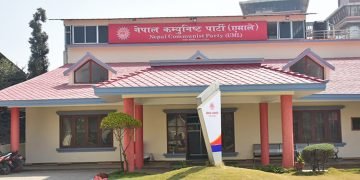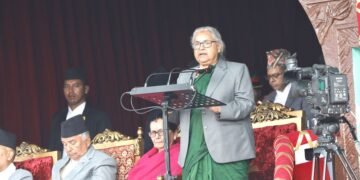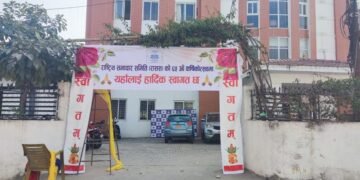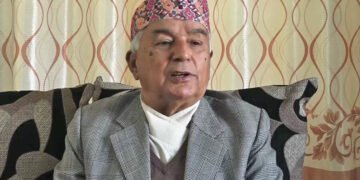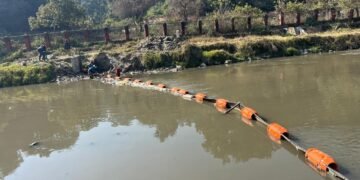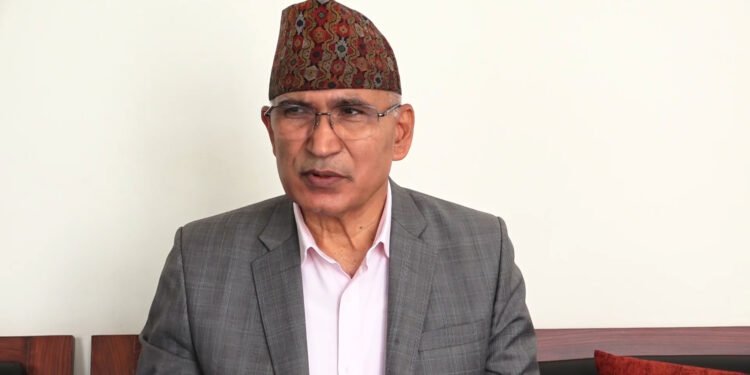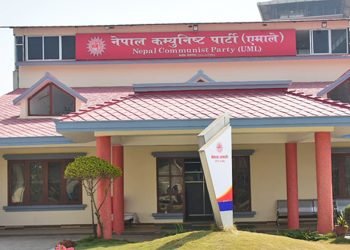Kathmandu, July 15: Deputy Prime Minister and Finance Minister Bishnu Prasad Paudel has been continuously representing Rupandehi district in the House of Representatives from the last four elections.
Finance Minister Paudel, who also serves as the Vice Chairman of the Communist Party of Nepal (UML), had previously been elected as a member of the House of Representatives from Palpa constituency number 3 in the general elections of 2051 BS.
In the year 2054 BS, he took on the responsibility of the Minister of Youth, Sports and Culture, and since then he has also served as the Minister of Water Resources, the Minister of Defence, and the Minister of Finance under various governments.
Vice Chair Paudel, who has built an image of having a balanced and clear stance within the party, has remained as a leader trusted by the party leadership.
The following is the edited excerpt of the interview taken by Rastriya Samachar Samiti (RSS) reporter Sushil Darnal with Deputy Prime Minister and Finance Minister Paudel on topics including the budget, monetary policy, the environment for foreign investment, and an assessment of the government’s one-year performance.
Q. How will the budget and monetary policy for the upcoming fiscal year 2082/83 propel ahead the country’s economic development?
A. The budget will help to stimulate the economy, increase production and productivity, create employment, and attract domestic and foreign investment. This budget has raised many key issues in the areas of energy, water resources, industrialization, labor employment, education, health, and agriculture. The government believes that implementing such programmes will make our economy dynamic.
The monetary policy should also naturally support economic development. Overall, through the effective implementation of the government’s monetary policy and budget, we can energize the economy. Therefore, we have projected an economic growth of six percent in the upcoming fiscal year.
Q. The current government has completed one year. What are the policy and legal reforms made during this period to create an investment-friendly environment in Nepal?
A. The current government has made many policy reforms to create an investment-friendly environment. Legal reforms have also been made.
In this connection, the government has brought the Financial Procedures and Financial Accountability (First Amendment) Act 2081, the Act to Amend Some Nepal Acts Related to Improving Economic and Business Environment and Promoting Investment 2081, the Privatization (First Amendment) Act 2081, the Customs Duty Act, 2081, the Banking Offences and Penalties Act 2082, and the Customs Act 2081.
Similarly, the Appropriations Act 2082, the National Debt Raising Act 2082, the Financial Act 2082, the Alternative Development Financing Mobilization Bill 2081 (presented in the House of Representatives), the Internal Revenue Operation Strategy 2081, the Standards for Making Public Expenditure Economical and Effective 2081, and Foreign Aid Mobilization Policy 2082 have also been made public.
However, there are challenges to the economy, including revenue collection as per targets, further increasing the capital expenditure, and getting Nepal off the Financial Action Task Force (FATF) grey list.
Q. How has the private sector’s liability repayment, economic growth rate, multi-year contract process, size of the economy, revenue growth, capital expenditure, and improvements in the capital market been?
A. Complaints and demands of private sector have been addressed and its self-confidence has boosted as well as problem of payment of construction companies have also been addressed.
A target of 4.61 per cent economic growth rate has been projected in the current fiscal year against 3.87 per cent in previous year, he opined, adding multi-year contract system has been made systematic and implementation-oriented. The size of economy has increased by Rs 400 billion and reached Rs 6,100 billion this year as well as Rs 1,097 billion as revenue has been collected this year.
Q. What was the situation of remittance inflow in the current fiscal year?
A. The remittance inflow has increased by 15.5 per cent in the current fiscal and reached 1,532 billion against Rs 1,327 billion in the previous fiscal year. Likewise, there is 18.65 billion US dollar foreign currency reserve this year while it was 14.72 billion US dollar in the previous fiscal year, he mentioned, stating that foreign aid commitment has also increased by Rs 119 billion in the current fiscal year which stands at Rs 219 billion.
Q. You have long experience in parliamentary practice. How do you analyze the current parliamentary practice of the country?
A. Parliamentary practices with riling parties and opposition should be excellent from all prospective. I believe that both ruling and opposition parties should be guided by agenda. I am surprised by the performance of opposition parties in recent period and why they are doing such activities. They have been raising issues without any basis and boycotting the parliament, which is not appropriate. The opposition parties should win the trust of the entire society through parliament and the role of some opposition parties is seen immature after they failed to maintain it.
Q. There are complaints that the constitution has not been fully implemented. What is your opinion on this?
A. Most of the provisions of the constitution have been implemented and many laws have been formulated as per sentiments and aspiration of the constitution. Two elections of three -levels were already conducted as envisioned by the constitution and people’s representatives have been working to fulfill their commitments made before the people during election.
It would take time to achieve objectives and goals envisioned by the constitution and means and resources are needed for the same. Overall, the constitution implementation has moved ahead in the right way and we have been effectively carrying out the remaining responsibilities related to constitution implementation.
Q. Although the government has raised the issue of constitutional amendment, there is no sign of the amendment starting, is there?
A. An amendment to the constitution is one of the vital aspects of the seven-point agreement reached among the political parties while forming the incumbent government. We have been since the beginning saying that the Constitution is not an unchangeable document. We believe that the Constitution is revisable as per the need of the time and society. We are committed toward that end. The constitution amendment is not a matter of majority and minority. It is the matter of a general consensus in the parliament and the government believes that it should be dealt with accordingly.
Q. It is said that the government has not paid sufficient attention to strengthening the federal structure, right?
A. Strengthening the federal structure is about the implementation of constitutional provisions in regard with the federal system. Now local, province and federal levels have established coordination and cooperation towards that end. The Constitution has determined the list of powers of local, province and federal governments and of concurrent powers. The government is working accordingly. However, federalism is totally a new practice for Nepal and its merits and demerits are being realized in the course of its exercise, and being based on experiences, it should be further enabled by correcting the weaknesses.
Q. It can be seen that negative comments are being made particularly about the current political system in the social media. What do you say on this?
A. The restoration of the outdated system is not possible. Any attempt to restore monarchy is to hinder the society from progressing. The revival of monarchy in the country is never ever possible. The culture of becoming a ruler by birth is neither matched with the social science nor with the law of nature. An assault on the supreme political system is unbecoming.
Q. Nepali people living both at home and abroad have consistently expressed disappointment about the situation in the country. Has our entire system become weak?
A. The periodic elections are the tools for testing the competency of political parties and party leaders. We have established a system in which people’s representatives are eligible to operate the form of the governance and people themselves will evaluate the performance of their representatives in a certain time frame. That’s why we practice an advanced democratic system founded on the advanced constitution. The overall state systems are not weaker.
Let those in governance be vigilant and warned, but let the system not be undermined. We must move forward with the confidence that we can build our nation. I urge everyone to support the government in its positive initiatives. Let us all have faith that the incumbent administration will lead the country toward development, prosperity, and social justice.

